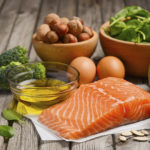
By Tina Paymaster, PHASE IV Nutritionist and Shelby Stoner, PHASE IV Exercise Physiologist
While exercise and remaining physically active is a large part of alleviating joint pain, nutrition plays just as big of a role. What many people don’t realize is that the food you eat may be affecting the levels of inflammation in your body, contributing to your bodily creaks and aches. Your body operates much like a car, the grade of gas and oil you put into it largely determine the car’s overall performance, just like how food supports our activities and fuels our metabolic “engine.”
What exactly is inflammation anyways? Inflammation is essentially your body’s alarm system that gets triggered when it senses any foreign invader such as an allergic reaction to dairy, bacteria or viruses, or any physical injury.
Acute inflammation is typically short-lived and most often correlated with an injury, while chronic inflammation occurs due to toxic substances in the body such as cigarette smoke, alcohol and certain foods. This is the type of inflammation that can lead to serious diseases from arthritis to heart attacks and even cancer.
No need to panic though. With some diet and lifestyle changes you can reduce inflammation and experience more energy, better sleep, less pain and even weight loss.
INFLAMMATORY FOODS
These 10 foods are the most common inflammatory foods to watch out for. Make sure to limit or avoid these to support your health.
1. Sugar
Eating too much sugar causes blood sugar spikes and when the body can’t process all of the glucose in the bloodstream it releases pro-inflammatory markers called cytokines. In addition, sugar suppresses the immune system making the body more susceptible to disease and infection. Inflammation caused to sugar has also been linked to certain cancers.
2. Vegetable Oils
Vegetable oils such as canola, soy, corn, sunflower, peanut and margarine are not only high in the inflammatory omega-6 fatty acid and low in the anti-inflammatory omega-3 fatty acid, but most of them are also genetically modified, sprayed with pesticides, heated at high temperatures which renders them rancid and treated with chemicals to create a more appealing color. So it’s best to avoid these and stick to healthier cooking oils such as olive oil, coconut oil, avocado oil, butter and ghee.
3. Trans Fats
Trans fats are man made partially hydrogenated oils most often found in fast food, fried food and processed/packaged foods. Because these are not naturally occurring oils, the body doesn’t not know how to break them down properly leading to inflammation in the body, so read your food labels carefully and watch out for these culprits!
4. Refined Flour
Refined flours are most commonly found in white bread, crackers, cereal, pasta, pizza and flour tortillas. These flours have been stripped of fiber and nutrients that slow down digestion. Because of this, your body will break down these foods much quicker, causing faster blood sugar spikes which lead to inflammation.
5. Processed Meats
Deli meats, bacon, sausage, hot dogs and jerky typically contain high amounts of saturated fats and advanced glycation end products (AGEs) which are created when these meats are pasteurized, smoked and dried at high temperatures. These AGEs can clog the small blood vessels of the kidney, heart, eyes and brain, contributing to diabetic conditions and attacking the immune system.
6. Grain-Fed Meat
Meat can be difficult to digest for people with sensitive stomachs. Add that to the fact that much of the conventional meat that is sold in the United States is grain-fed and pumped full of antibiotics, and you have a recipe for a super inflammatory meal. In addition, when meat is grilled at high temperatures it creates inflammatory carcinogens. It’s best to choose pasture-raised, organic meat when possible, reduce red meat intake to 3 days or less per week and choose healthier means of cooking such as baking, roasting, poaching or lightly grilling.
7. Alcohol
While some research has shown benefits to consuming one alcoholic beverage a day, the risks of having one too many far outweigh the benefits. When alcohol is broken down it creates toxic byproducts which can damage the liver, promote inflammation and decrease immune function. Excess alcohol consumption is also linked to heart disease, cancer, stroke and digestive issues. If weight loss is on your mind, it’s also important to remember that when your liver is overloaded with breaking down alcohol, it can’t focus on breaking down fat.
8. Dairy
While organic yogurt can help to reduce inflammation in the body, for some, dairy can be an incredibly inflammatory food. Similar to meat, the protein in dairy, casein, can be a complex and difficult substance to digest. In addition, much of the dairy available on the market is genetically modified and produced from milk from antibiotic-treated cows. If you sense you may have a sensitivity to dairy, try eliminating it for 2-4 weeks to see if you notice any difference in your pain, digestion and overall health. You can also try goat’s milk as an alternative to cow’s milk if you must have dairy. Regardless, always choose organic dairy when possible.
9. Gluten
These days, most store bought breads go from flour to bread in just hours, compared to the slow fermentation process of traditionally baked breads that can take a few days. This shortening of baking time renders the gluten content much higher in bread making it more difficult to digest, which may explain the rise of gluten sensitivities and allergies. In addition, much of the wheat in the United States is genetically modified and hybridized. Because of this, the body may not recognize it as food and can mistaken wheat-containing foods as foreign substances, causing an inflammatory response. If you’re experiencing chronic pain, it’s best to avoid foods that contain gluten or opt of sourdough bread in lieu of other store bought breads.
10. Artificial Sweeteners
Studies over the past few years have shown that zero-calorie sugar substitutes such as sucralose, saccharin and aspartame alter the gut microbiota, specifically bacteria that impact the body’s metabolism. The studies showed that increase the type of gut bacteria that is most efficient at turning energy (food) into fat. In addition, artificial sweeteners have been shown to lead to glucose intolerance, making them unfit for pre-diabetic, diabetic or really any type of people. The reality is that artificial means “not real food,” and therefore the body doesn’t know how to properly metabolize these ingredients leading to digestive issues, inflammation and weight gain! It’s best to avoid these products and instead include small amounts of natural sweeteners such as raw honey, pure maple syrup, jaggery, date sugar or coconut sugar.
ANTI-INFLAMMATORY FOODS
If pain has got you down, make sure to include these top 7 items will put you on the right track towards fighting inflammation and ridding your pain!
1. Fish
Fresh fish such as salmon and tuna are known for their omega-3 fatty acids, which are common inflammation fighters. Research finds that people who regularly eat fish high in omega-3s are less likely to develop rheumatoid arthritis (RA), and in those who already have the disease, marine omega-3s may help reduce joint swelling and pain.
Check out this great salmon recipe!
2. Fruit
Fruits, especially a wide variety of colors are chock full of antioxidants. Fun fact: the substance that gives fruits like cherries, raspberries, and blackberries their color is a type of pigment that also helps fight inflammation!
Look for these fresh fruits at your local grocery store or farmers market:
Dark blues and purples: blackberries, plums, grapes
Bright reds, oranges, yellows: apples, papaya, or pineapple
3. Dark, Leafy Greens
If you’re lacking in the vitamin and minerals department, chances are you aren’t eating these dark green leafy vegetables such as spinach, kale, or swiss chard that are packed with important nutrients and antioxidants. The rich supply of vitamin E in dark leafy greens is believed to protect against inflammatory molecules such as cytokines. Additionally, they are rich in various other vitamins with anti-inflammatory properties.
4. Ginger and Turmeric
Rather than flavoring your food with fat and sugar, try using spices instead! Spices like ginger and turmeric have many anti-inflammatory properties, and add great flavor to many popular dishes.
5. Healthy Oils and Nuts
Healthy oils and nuts provide us with good fats that fight inflammation and heart disease. Some of the best include olive and flaxseed oil, as well as almonds, walnuts, and macadamia nuts.
6. Tea
We often recommend tea as an alternative to coffee in the morning and as a sleeping aid at night. There are many types of tea that provide the energizing or soothing effects you’re looking for without the harmful consequences. Green teas are great for being high in antioxidants, as well as black and herbal teas.
Check out this ginger tea we love at the office!
7. Chia Seeds and Flax Seeds
Chia and flaxseeds are both high in omega-3 fatty acids. Try incorporating these into your daily diet by throwing ground-up flaxseeds into cereal or add chia seeds to baked goods or smoothies.
PERSONALIZED NUTRITIONAL SUPPORT
While changing the way you look at food may sound simple, breaking old habits can be difficult and may require additional support and guidance. For more information on anti-inflammatory diets, schedule your FREE Nutrition consultation today by calling (310) 582-8212 or email Tina directly at tina@phase-iv.net.
Want more nutrition and fitness tips? Sign up for our newsletter and never miss another article








